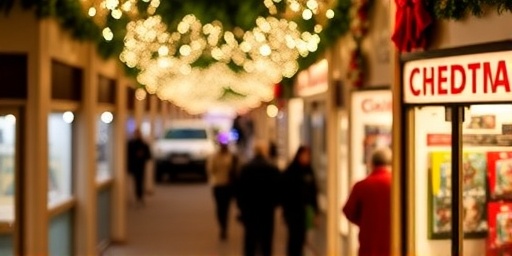As holiday lights twinkle across Denver’s bustling streets, local shoppers are tightening their belts this season, planning to spend 14% less than last year amid soaring inflation and economic jitters. Yet, in a stark contrast, national retailers are buzzing with optimism, projecting the first-ever $1 trillion Holiday spending bonanza driven by resilient consumer demand and strategic promotions.
- Denver Shoppers Trim Holiday Budgets Amid Rising Costs
- National Retailers Bet on Record-Breaking $1 Trillion Holiday Sales
- Tariffs and Inflation Squeeze Denver’s Holiday Shopping Sentiment
- Local Retail Strategies Counter Cautious Denver Consumers
- Looking Ahead: Balancing Caution with Holiday Optimism in Denver
Denver Shoppers Trim Holiday Budgets Amid Rising Costs
In the heart of Colorado’s capital, Denver’s holiday shopping scene is taking on a more cautious tone. A recent survey by the Denver Metro Chamber of Commerce reveals that local consumers anticipate slashing their holiday budgets by an average of 14%, down from $1,200 per household last year to about $1,032 this season. This pullback is largely attributed to persistent economic uncertainty, including inflation rates hovering around 3.7% nationally and local gas prices that have spiked 12% since summer.
“We’re seeing families prioritize essentials over extravagance,” said Elena Ramirez, a financial advisor with Denver-based Prosperity Financial Group. “Many are citing grocery bills up 20% and utility costs that are eating into disposable income.” Consumer sentiment in Denver mirrors broader national trends but feels amplified by the city’s reliance on tourism and service industries, which have been hit hard by post-pandemic recovery challenges.
The survey, which polled over 1,500 Denver-area residents, highlighted specific cutbacks: 62% plan to reduce spending on gifts, 45% will skip non-essential decorations, and 38% intend to limit travel for family gatherings. Retail sales in key Denver districts like Larimer Square and 16th Street Mall have already shown a 7% dip in early November foot traffic compared to 2023, according to city economic data.
Local retailers are feeling the pinch early. At Cherry Creek Shopping Center, a hub for upscale holiday buys, store owners report slower sales in apparel and electronics categories. “Customers are browsing more but buying less,” noted Sarah Jenkins, manager of a boutique jewelry store. “They’re waiting for deeper discounts, which tells me Holiday spending is definitely more restrained this year.”
National Retailers Bet on Record-Breaking $1 Trillion Holiday Sales
While Denver’s shoppers hunker down, the national retail landscape paints a rosier picture. The National Retail Federation (NRF) forecasts total Holiday spending to hit a historic $1.05 trillion from November through January, up 3.8% from last year’s $1.01 trillion. This projection underscores a resilient retail sales environment, fueled by wage growth outpacing inflation in some sectors and aggressive Black Friday deals that could lure bargain hunters back to stores.
“Despite pockets of caution, American consumers remain the engine of our economy,” NRF Chief Economist Jack Kleinhenz stated in a recent report. “We’re expecting strong performance in categories like toys, apparel, and electronics, with online sales leading the charge at over $240 billion.” The optimism stems from improved supply chain logistics post-COVID and a surge in e-commerce platforms offering free shipping thresholds that encourage impulse buys.
Nationally, retail sales have rebounded steadily, with October figures showing a 0.6% month-over-month increase to $709.6 billion, per U.S. Census Bureau data. Major chains like Walmart and Amazon are ramping up inventory, predicting that doorbuster events will offset any dips in discretionary holiday spending. In fact, early indicators from Cyber Monday previews suggest digital sales could break records, potentially adding $12.4 billion in a single day.
For Denver retailers with national ties, this broader trend offers a lifeline. Stores like Target and Best Buy in the Denver area are leveraging corporate-wide promotions to draw crowds, even as local consumer sentiment lags. “Our national forecasts give us confidence to stock up,” said a Best Buy regional spokesperson. “Denver’s market might be softer, but the overall tide will lift all boats.”
Tariffs and Inflation Squeeze Denver’s Holiday Shopping Sentiment
Economic headwinds like proposed tariffs are casting a long shadow over Denver’s holiday preparations. With the incoming administration signaling steeper import duties on goods from China—potentially up to 60% on electronics and toys—local experts warn that these measures could further erode consumer sentiment and inflate prices just as the giving season peaks.
“Tariffs aren’t abstract; they’re going to show up on price tags,” explained Dr. Marcus Hale, an economics professor at the University of Denver. “Denver households, already stretched thin, might see toy prices jump 15-20%, prompting even more scaled-back holiday spending.” A study by the Peterson Institute for International Economics estimates that new tariffs could add $2,600 annually to the average family’s costs, hitting urban centers like Denver hardest due to higher import-dependent lifestyles.
Consumer sentiment surveys reflect this unease. The Conference Board’s index dipped to 102.5 in October, with Denver respondents particularly vocal about tariff fears exacerbating inflation. “I’m holding off on big purchases until I see how these policies shake out,” shared local resident Tomas Rivera in a street interview. “Last year’s gifts were fun, but this year, it’s practical stuff only.”
Retailers in Denver are adapting by sourcing more domestically or from tariff-light countries like Mexico and Vietnam. However, the uncertainty has led to conservative inventory planning, with some stores delaying restocks until post-election clarity emerges. This cautious approach could temper retail sales growth locally, even as national figures soar.
Local Retail Strategies Counter Cautious Denver Consumers
Undeterred by Denver’s tempered enthusiasm, local retailers are deploying innovative tactics to boost holiday sales and restore consumer sentiment. From pop-up markets in RiNo Art District to extended hours at Union Station, businesses are focusing on experiential shopping to draw in foot traffic despite economic uncertainty.
“We’re emphasizing community events and loyalty programs to build excitement,” said Lisa Chen, owner of a family-run gift shop in Capitol Hill. “Flash sales tied to local charities have helped—people want to feel good about their spending.” Data from the Denver Retail Council shows that event-driven shopping has increased sales by 11% in participating stores year-over-year, a bright spot amid broader caution.
Small businesses, which make up 70% of Denver’s retail ecosystem, are particularly agile. Many are pivoting to personalized services, like custom gift wrapping or virtual styling sessions, to justify premium pricing without alienating budget-conscious shoppers. Larger chains, meanwhile, are rolling out price-matching guarantees to combat tariff-induced hikes.
Quotes from industry leaders underscore the resilience. “Denver’s spirit is unbreakable—even in tough times, holidays bring people together,” remarked Colorado Retail Association President Kim DeGirolamo. “We’re predicting a 5% uptick in local retail sales by focusing on what matters: value and connection.” These efforts aim to bridge the gap between wary consumers and optimistic forecasts, potentially stabilizing Denver’s holiday economy.
Looking Ahead: Balancing Caution with Holiday Optimism in Denver
As December approaches, Denver’s holiday landscape teeters between restraint and renewal. While the 14% drop in planned spending signals ongoing challenges from inflation and tariffs, retailers’ confidence in national trends could spark a late-season rally. Economists predict that if Black Friday and Cyber Monday deliver as expected, spillover effects might encourage more Denver shoppers to loosen purses for key gifts.
Forward-looking strategies include enhanced digital integration, with 55% of Denver consumers planning to shop online this year per NRF data, up from 48% last season. Local governments are also stepping in, offering tax-free weekends for essentials to ease burdens. “The key is adaptability,” Hale from the University of Denver advised. “Retailers who listen to consumer sentiment will thrive, turning uncertainty into opportunity.”
Ultimately, this holiday season could redefine retail sales dynamics in Denver, blending scaled-back budgets with innovative appeals that foster lasting loyalty. As national projections hit the trillion-dollar mark, the Mile High City’s shoppers and sellers alike are poised for a resilient, if redefined, festive period—one where economic savvy meets holiday cheer.








